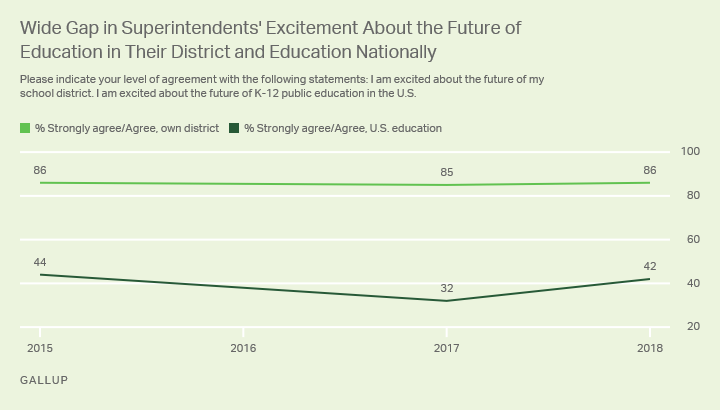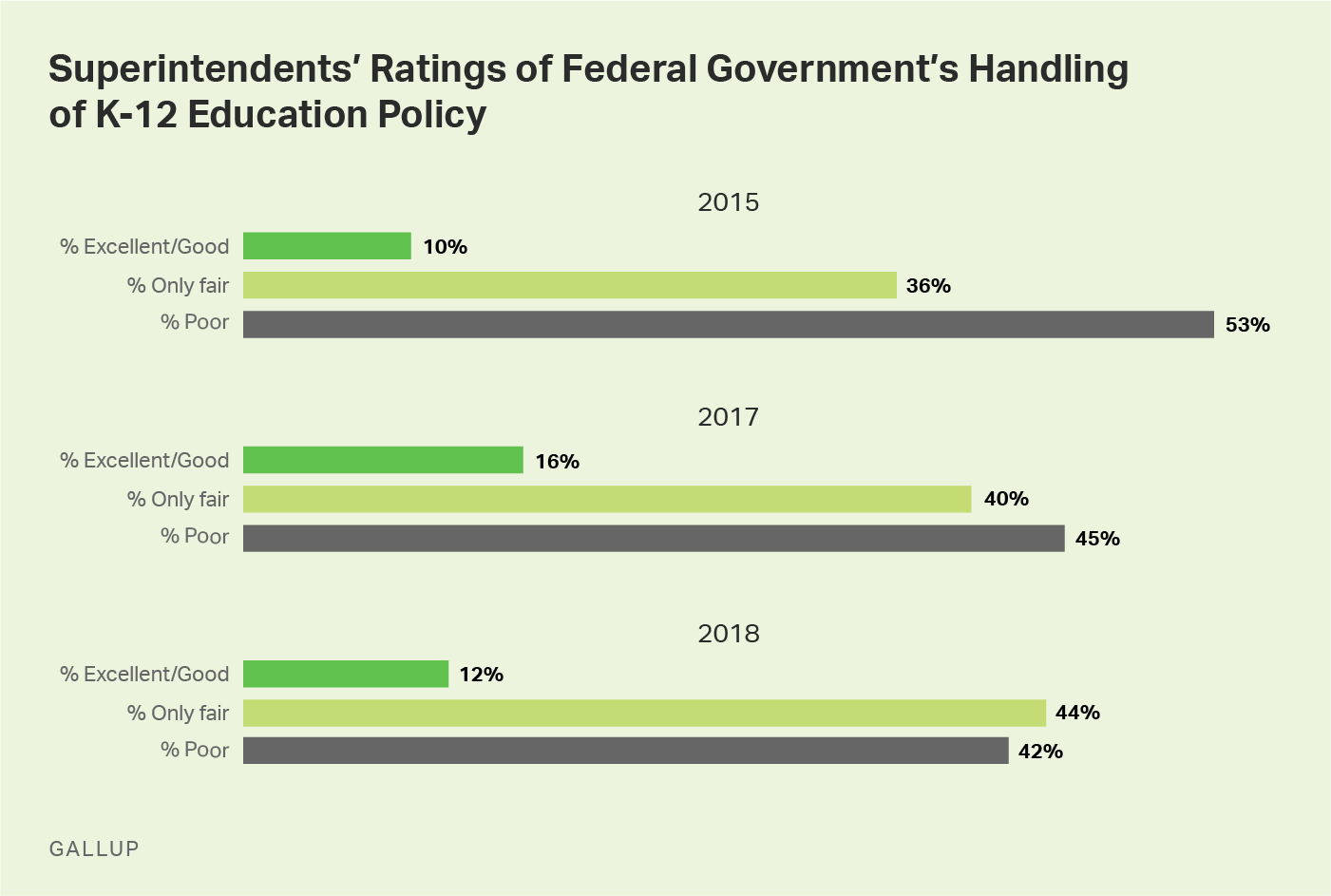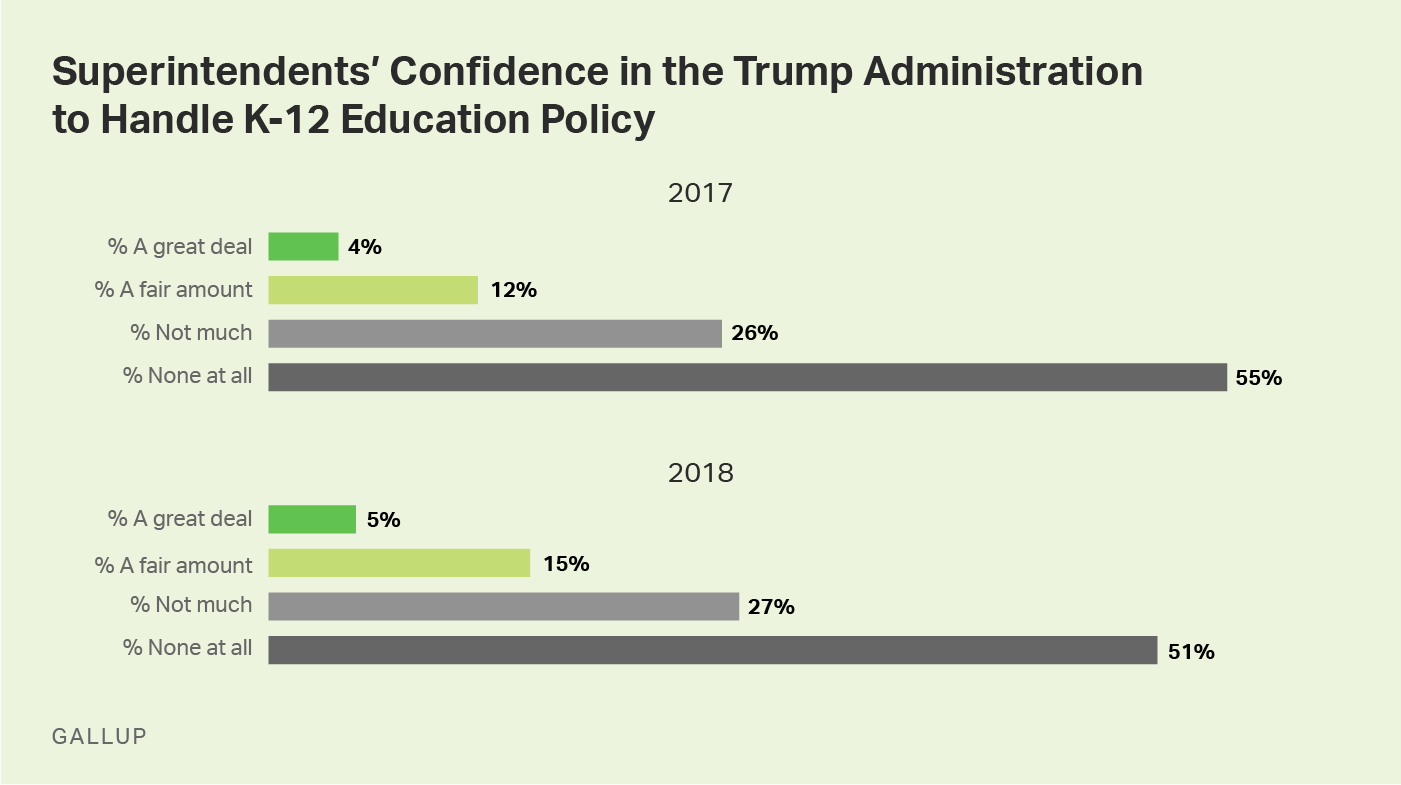Story Highlights
- U.S. superintendents are mostly excited about the future
- They are critical of the federal government's handling of K-12 education policy
- Excitement about the future of U.S. education has rebounded this year
U.S. public school superintendents remain enthusiastic about the future of their school district, but they are much less excited about public education nationwide. Eighty-six percent of K-12 superintendents agree they are excited about the future of their district, including 53% who strongly agree. Only half as many, 42%, agree they are excited about the future of K-12 public education in the U.S.
These results are part of Gallup's 2018 Survey of K-12 School District Superintendents. The questions about the future of education have been asked twice before, in 2015 and 2017. Each survey has shown a wide gap in excitement about superintendents' own district and education nationally.

Such discrepancies are fairly common when respondents are asked to assess their own situation and the situation in the country more broadly, particularly in U.S. adults' evaluations of education. Evaluations of one's own situation are likely informed by the respondent's experiences -- and are situations they have some amount of control over to change if they are dissatisfied. In contrast, assessments of national conditions may rely mainly on (often unflattering) news reports or other indirect sources of information.
U.S. public school superintendents remain enthusiastic about the future of their school district, but they are much less excited about public education nationwide.
The gap in superintendents' ratings of their own district and education nationally is smaller this year than a year ago, because their opinions about the future of U.S. education have become more positive. In 2017, 32% agreed they were excited about the future of education nationally. This year, excitement levels about U.S. education have reverted back to where they were in 2015, when 44% agreed they were excited. The reasons for the more negative opinions in 2017 are unclear, although it is possible that uncertainty about the Trump administration's plans for education policy may have been a factor.
Superintendents in large school districts, based on student enrollment, are more likely than those in smaller districts to strongly agree they are excited about the future of their district. Sixty-five percent of superintendents overseeing districts of at least 4,000 students strongly agree they are excited about the future of their district, compared with 56% of those in districts with 1,000 to 3,999 students and just 49% of those in districts with fewer than 1,000 students.
Superintendents Critical of Government's Handling of K-12 Education Policy
One reason superintendents may lack enthusiasm about the future of K-12 education in the U.S. is that they do not think the federal government is doing a good job handling education policy. Just 12% believe the government is doing an excellent or good job, while 44% think it is doing a fair job and 42% a poor one. These ratings were similarly poor when Gallup asked the same questions in 2015, toward the end of the Obama administration, and in 2017, in the first year of the Trump administration. Slightly fewer have given a poor rating the past two years than did so in 2015.

Superintendents' frustration with federal education policy precedes the Trump administration, but they likely are not optimistic that things will get better during his term. A slim majority of superintendents, 51%, say they have "no confidence at all" in the Trump administration to handle K-12 education policy. Twenty-seven percent say they do not have much confidence in the administration, while one in five have either a great deal (5%) or a fair amount (15%) of confidence.
Slightly fewer superintendents this year than in 2017 say they have no confidence at all in the administration.

Discover What These Findings Mean for the Future of K-12
Superintendents face a number of challenges in their jobs, with finding and retaining talented teachers among the biggest -- but they remain very optimistic about what the future will bring to their district. They continue to be less positive about the future of education in the country as a whole, although their optimism has bounced back after declining a year ago. Superintendents remain concerned about the readiness of high school graduates for college and the workforce. Making positive strides in students' readiness for their postsecondary pursuits, and perhaps a fundamental reconsideration of federal education policy, could go a long way toward making superintendents more excited about the future of K-12 education nationwide.
About the Study
Gallup developed this research study of K-12 superintendents of public school districts in the U.S. to understand opinions on important topics and policy issues facing education. Since 2013, Gallup has conducted the survey at least annually. The 2018 report addresses a variety of issues, including:
- the future of K-12 education
- challenges facing K-12 education
- evaluating effectiveness of the public schools
- student preparedness
- work partnerships
- combined work/higher education programs for high school graduates
- federal education policy
- school safety measures
Download the full report, Leadership Perspectives on Public Education: The Gallup 2018 Survey of K-12 School District Superintendents.
Discover Gallup's education insights and advice to transform your school:
- Gain strategies to create thriving students and schools with courses for educators.
- Learn why educators at all levels use CliftonStrengths to develop thriving students and schools by watching this video.
- Hear insights into the economics of the teacher shortage, confidence in the labor market and the costs of employee turnover by registering for this webinar.





